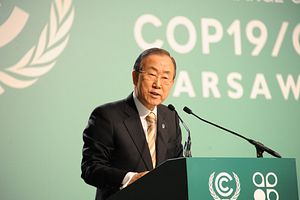Such is Ban Ki-moon’s popularity in South Korea that he was mobbed Thursday night as he tried to leave Incheon International Airport on his first homecoming since his tenure as United Nations secretary general ended.
Ecstatic Koreans tried to hand him bouquets of flowers and shake his hands as he made his way through a human tunnel that literally collapsed around him as he tried to exit the airport. The crowd looked so tight at times that the 72-year-old may have been unable to lift an arm to offer those greatly desired handshakes.
Many people were there to cheer Ban on to the South Korean presidency — an office he has yet to officially say he’s seeking. But he again hinted at the prospect in an address to his fans after arriving in the terminal.
“I’ve been saying I will listen to our people’s thoughts after returning home. I will have that opportunity from tomorrow. I will make a selfless decision with a humble heart,” said Ban, according to Reuters.
Ban said a decision would be coming soon about how he plans to serve his country. If the turnout at the airport is any indication of support, Ban won’t be lacking advocates if he runs.
One of Ban’s fan clubs, Bansamo, which literally means “a group that loves Ban,” was there to cheer on their returning champion.
“We came here because Ban did something great for the world and now is coming back. So we came here to welcome him,” said Kang Seok-jun, the head of Bansamo.
Kang said they founded the group in 2010 solely to support the UN secretary general, and Bansamo is “pure” without political or religious bias.
Ban has long enjoyed support at home. He rose from poverty as a young man to become leader of the UN. South Korea’s own improbable growth runs parallel to his success.
Aidan Foster-Carter, an Honorary Senior Research Fellow in Sociology and Modern Korea at Leeds University, said Ban’s humble roots may help a bid for the Blue House.
But he believes it’s Ban’s image as an outsider that’s driving his current popularity.
“There’s a kind of yearning for a white knight, somebody who is thought to be outside the system and unsullied,” said Foster-Carter.
“There doesn’t seem to be an issue that he wasn’t a particularly good UN secretary general, and he certainly has his critics. He is his own guy, he’s famous, he’s known, and he’s allegedly not corrupted.”
Ban was quick to address corruption once back home. During his airport address, he said there’s no truth to rumors now circulating about him in the press.
A local magazine, Sisa Journal, reported allegations Ban took a large bribe when he was South Korea’s foreign minister. And just this week, his brother and a nephew were indicted in U.S. federal court on bribery charges.
Ban said Wednesday in New York he was “perplexed and embarrassed” about the family indictment, according to Reuters.
Rhee Jong-hoon, a political commentator at iGM Consulting, said the allegations could damage a campaign. But they’re not “crucial faults” when compared to other South Korean presidential candidates who have fought through similar allegations.
“The most important thing about unfavorable factors is how frankly and well he explains them. We have to see how it goes,” said Rhee.
Ban also faces scrutiny from fractured political parties hoping the well-liked diplomat will bear their flag as a presidential candidate.
Currently, Ban has no party to call home; Foster-Carter called him a centrist. He served as foreign minister under a liberal administration. Lately, he’s been courted by parties on both sides, including the ruling Saenuri Party and its defectors, the new Barun Party.
Some political analysts suggest he may create his own party. Others say it’s too late considering there may be a special election in the coming months to replace impeached President Park Geun-hye.
South Korea’s opposition, meanwhile, has a strong candidate in Moon Jae-in, the former head of the Democratic People’s Party who lost the 2012 election to Pres. Park.
It’s this tug-of-war over the famous Ban that may draw the 72-year-old into a race for the presidency in a country facing political and economic crises.
“There has been a common view that Ban is the conservative camp’s hope. He seems to have accepted their view,” said Rhee.
Foster-Carter said people have a sense that if someone “tells you you’re their country’s savior, it must be a pretty siren song.”
He also agreed the frayed party lines encourage a run.
“It helps the conservatives don’t really have any particular any good or prominent candidates anymore, do they? Whereas the liberals have got quite a few,” Foster-Carter said. “So all that sort of means he’s the man of the moment, isn’t he? Ban the man.”































